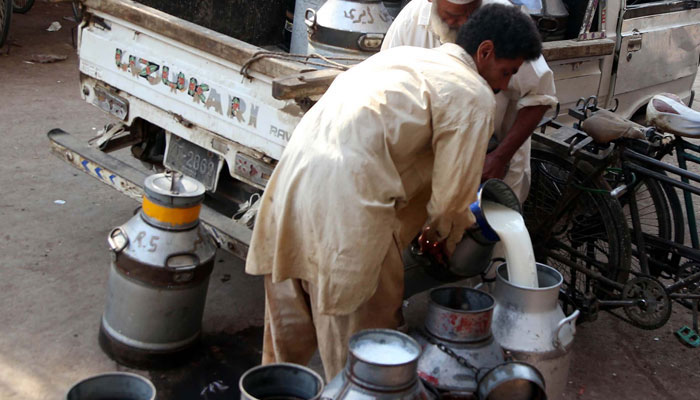Tax anomaly to cost raw milk sellers billions of rupees annually: CDFA
LAHORE: Raw milk sellers in the formal dairy sector have reached out to the prime minister urging him to remove raw/unbranded milk from the exempt category and back to the zero-rated regime.
In the FY25 budget unveiled on June 12, raw milk sellers were put in the exempt category which implied that going forward, input sales tax on raw material and other inputs will become part of their cost of production.
In a letter to the prime minister sent on Monday, Chief Operating Officer Haroon MK Lodhi of the Corporate Dairy Farmers Association (CDFA) highlighted that “in case input sales tax becomes part of raw milk’s cost of production, this will lead to an additional charge of up to Rs12per litre, which will translate into about Rs8 billion annually.” “In our view”, he observed, “this policy change where input sales tax cannot be passed on to consumers is a clear anomaly. Owing to this anomaly, the financial burden so created will have to be absorbed by the organized dairy sector.”
Lodhi stated in his letter that “dairy farmers are already facing extreme cost and cash flow pressures partly due to pending sales tax refunds and partly due to an increase in production cost over the past few years. Any additional burden in the form of input sales tax becoming part of the cost of raw milk will have a devastating impact.”
He also said that this may make “many dairy farmers consider exiting this business.”“This policy change will be detrimental to organized/documented dairy farmers, and this will encourage the informal dairy sector, harbouring unhygienic milk suppliers and discouraging the regulated economy of organized dairy farmers who are registered taxpayers. Eventually decades of effort and investment in organized dairy farming will go wasted.”
The CDFA requests the government to either keep raw milk in the zero rated regime or treat it like processed milk so that input sales tax can either be claimed as a refund or passed on to the buyer of raw milk.
According to a CDFA report, the proposed policy change will inadvertently encourage the informal dairy sector, furthering the undocumented economy and promoting the increased supply of unhygienic and adulterated loose milk. Under the exempt policy, organized dairy farmers will be squeezed between dairy processors’ (18 per cent sales tax on packed milk produced by dairy processors) inability to pay increased cost to organized dairy farmers due to input sales tax.
The report says that “consequently, the price gap will increase between loose milk produced by unorganized small farmers and milk produced by the organized sector. And there are chances that dairy processors start buying milk from the unorganized sector as that milk will be much cheaper compared to milk produced by organized dairy farmers. So, the organized sector will squarely be at disadvantageous position.
The CDFA is a company set up under Section 42 of the Companies Ordinance, 1984 with the aim to work for the betterment of dairy farming sector in the country. Organized dairy farmers comprising corporate and commercial dairy farms are registered and fully compliant taxpayers. They produce quality milk for consumers by employing world-class modern dairy farming practices.
-
 Kanye West's Best Songs: Fans Argue Over Bold Top 10 Ranking On Social Media
Kanye West's Best Songs: Fans Argue Over Bold Top 10 Ranking On Social Media -
 King Charles Secretly Relies On Advice From THIS Royal
King Charles Secretly Relies On Advice From THIS Royal -
 Jennifer Garner Reveals Beauty Choice She Makes As Botox Alternative In Her 50s
Jennifer Garner Reveals Beauty Choice She Makes As Botox Alternative In Her 50s -
 Kate Middleton Drops Four-word Message For Young Girl After Wales Visit
Kate Middleton Drops Four-word Message For Young Girl After Wales Visit -
 Shamed Andrew Uncensored ‘massages’ Should Be Refunded To Public
Shamed Andrew Uncensored ‘massages’ Should Be Refunded To Public -
 Kylie Kelce Reveals Rules She Wants Daughter Bennett To Learn At 3: No More 'passies'
Kylie Kelce Reveals Rules She Wants Daughter Bennett To Learn At 3: No More 'passies' -
 Smartphone Market Set For Biggest-ever Decline In 2026
Smartphone Market Set For Biggest-ever Decline In 2026 -
 Mud, Rain, Loincloths: All About Japan’s 200-year-old Harvest Wrestling Ritual
Mud, Rain, Loincloths: All About Japan’s 200-year-old Harvest Wrestling Ritual -
 Jonathan Majors Set To Make Explosive Comeback To Acting After 2023 Conviction
Jonathan Majors Set To Make Explosive Comeback To Acting After 2023 Conviction -
 Next James Bond: Why Jacob Elordi May Never Get 007 Role?
Next James Bond: Why Jacob Elordi May Never Get 007 Role? -
 Maddox Drops Pitt From Surname In Credits Of Angelina Jolie’s New Film 'Couture' Despite Truce From Father's End In Legal Battle
Maddox Drops Pitt From Surname In Credits Of Angelina Jolie’s New Film 'Couture' Despite Truce From Father's End In Legal Battle -
 Meghan Markle Adds Diamonds To Engagement Ring For Jordan Trip
Meghan Markle Adds Diamonds To Engagement Ring For Jordan Trip -
 Burger King Launches AI Chatbot To Track Employee Politeness
Burger King Launches AI Chatbot To Track Employee Politeness -
 Andrew’s Woes Amid King Charles’ Cancer Battle Triggers Harry Into Action For ‘stiff Upper Lip’ Type Dad
Andrew’s Woes Amid King Charles’ Cancer Battle Triggers Harry Into Action For ‘stiff Upper Lip’ Type Dad -
 Experts Warn Andrew’s Legal Troubles In UK Could Be Far From Over
Experts Warn Andrew’s Legal Troubles In UK Could Be Far From Over -
 Teyana Taylor Reflects On Dreams Turning Into Reality Amid Major Score
Teyana Taylor Reflects On Dreams Turning Into Reality Amid Major Score




